
*
The holidays are here once more, resulting in a cascade of interesting and intriguing titles. So much so that the discussions are necessarily briefer than usual.
Leading the pack are two Blu-rays from the Criterion Collection. Ask me to name my favorite films of all time, and "Modern Times" (1936) makes the list. Two Chaplin titles are on that list, actually, the other being "City Lights"; with two earlier efforts — "The Kid" and "The Gold Rush" — on the related and somewhat lengthy list of films I most want to see on Blu-ray.
Modern Times [Criterion] was about just that, in any number of ways. Modern in dealing with the machine age; Charlie is a mass production worker in a monster of a modern-day factory, patterned on Henry Ford's automobile assembly line. Hence the most familiar scene from the film, or at least the iconic still: Charlie threaded through the gears of an enormous machine, his two little wrenches tightening two little nuts. Charlie the worker does, in fact, go nuts; the repetitive motion of tightening those nuts becomes uncontrollable, and woe betide any buxom matron who comes by with buttons on her dress. Modern times — circa the middle of the Great Depression — continue to intrude, with strikes, communist protests, hungry people stealing bread, and more.
But Chaplin was a filmmaker, the greatest and most successful of modern and all times. The greatest of the silent era, at least, and for him one of the major elements of modern times was the arrival of talking pictures in 1927. Chaplin's worldwide popularity was due in part to the silence of his character, the tramp; a veritable Everyman. For "City Lights," in 1931, he simply ignored sound; audiences, who until recently had never heard the screen talk, happily bought into the conceit that Charlie's new film was (virtually) silent. Five years later, though, the notion of a silent film was decidedly outdated and old-fashioned. So, part of the modernity of "Modern Times," along with machines and strikes, had to be the inclusion of sound. Leave it to Chaplin to find ways to add sound, and dialogue, without having any character actually speaking. And while there had always been musical accompaniments for Chaplin silents, "Modern Times" used music as a major element; the main theme, which Chaplin theoretically wrote, was strong enough to find future life as the pop standard "Smile" (as in "Smile, though your heart is breaking"). We say theoretically because while Chaplin wasn't strong on sharing credit for anything, he had a 23-year old assistant named David Raksin whose job was to "take down" whatever Chaplin might hum and turn it into a masterpiece. In any case, the theme plays an important part in the film, especially in the final scene; what need words when the music swells? "Modern Times" looks very good on Blu-ray, although it's fair to say that the most recent DVD restoration was notably good. Bonuses include two documentary discussions of the film; another centering on visual and sound effects; two cut sections; a 1992 interview with the aforementioned David Raksin; the 1916 two-reeler "The Rink," which can be compared to Chaplin's skating exhibition in the department store section of "Modern Times"; and an 18-minute home movie shot by Alistair Cooke on a 1933 weekend yachting excursion to Catalina with Charlie and Paulette Goddard.
*
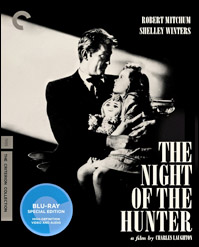 |
Words can't begin to describe this film; you really need to see it. This is a Depression-era tale set in Appalachia about an itinerant preacher (Robert Mitchum) — the words love and hate are tattooed on his fingers, if that gives you an idea — who marries the widow (Shelley Winters) of a bank robber and terrorizes her children, the better to find the hidden money. They flee and seek protection from a strong-willed woman (Lillian Gish), who proves to be a match for the preacher. But a description can only hint at the marvels of this movie, which has the feel of a German expressionistic film of the 1920s translated to Appalachia via 1955 Hollywood. Screenwriter James Agee, from Tennessee, and director Laughton, from Yorkshire, plus Hollywood movie star Mitchum at his grittiest, Actors Studio-sexpot Winters at her best, and silent film legend Gish at her strongest. Anyone familiar with this movie is likely to immediately say that those countless haunting images captured by cinematographer Stanley Cortez must look remarkable on Blu-ray. Shelley's final image, anyone?
Bonuses include a new documentary with interviews; a clip from the "Ed Sullivan Show" with cast members performing a scene deleted from the film; an archival 15-minute documentary about the film; and the full-scale documentary "Charles Laughton Directs 'The Night of the Hunter.'" Filled with outtakes, behind-the-scenes footage and more, this last runs two-and-a-half hours — an hour longer than the film itself — and makes a fascinating supplement to a fascinating film.
But the bonuses are merely dressing compared to "The Night of the Hunter" itself. If you haven't seen it, grab it. And if you have seen it, isn't it time to watch it again? Haunting, frightening, beautiful, and unforgettable.
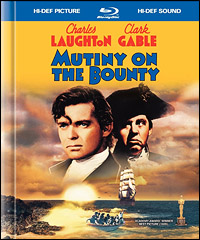 |
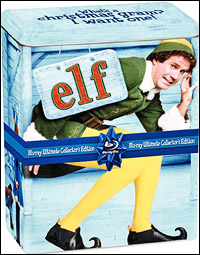 |
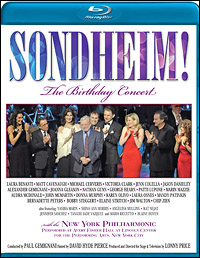 |
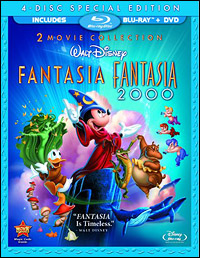 |
Also from Disney comes The Boys: The Sherman Brothers' Story. This is a documentary about the brothers Richard M. and Robert B., Walt's in-house songwriters — his only in-house songwriters ever — known the world round for "Mary Poppins" and that fiendishly irrepressible song written for the 1964 World's Fair, "It's a Small World." (They are also the composer-lyricists of the stage musicals Over Here! and Busker Alley, although those songs never made anyone's hit parade.) Of what interest can a documentary about two Disney writers be?
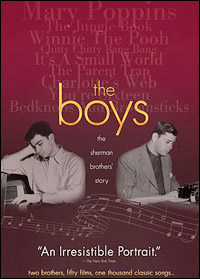 |
The two sons of the two songwriting brothers broke the ice at the 2002 London opening of the stage version of Chitty Chitty Bang Bang, finding that they had a lot in common (no foolin'!), and prevailed on their respective fathers to allow this unconventional family portrait. On-screen interviews come from folks like Julie Andrews, Dick Van Dyke, Hailey Mills, Angela Lansbury, Stephen Schwartz, Sheldon Harnick, Tony Walton, Roy Disney, and quite a few appearances by Ben Stiller. (Why Ben Stiller? Turns out he's one of the executive producers.) So, here for the holidays is a family film from Disney, but not the sort of Disney holiday family film you might expect.
(Steven Suskin is author of the recently released Updated and Expanded Fourth Edition of "Show Tunes" as well as "The Sound of Broadway Music: A Book of Orchestrators and Orchestrations," "Second Act Trouble," and the "Opening Night on Broadway" books. He also writes Playbill.com's popular Shelf Life and On the Record columns. He can be reached at [email protected].)
*
Visit PlaybillStore.com to check out theatre-related DVDs for sale.










